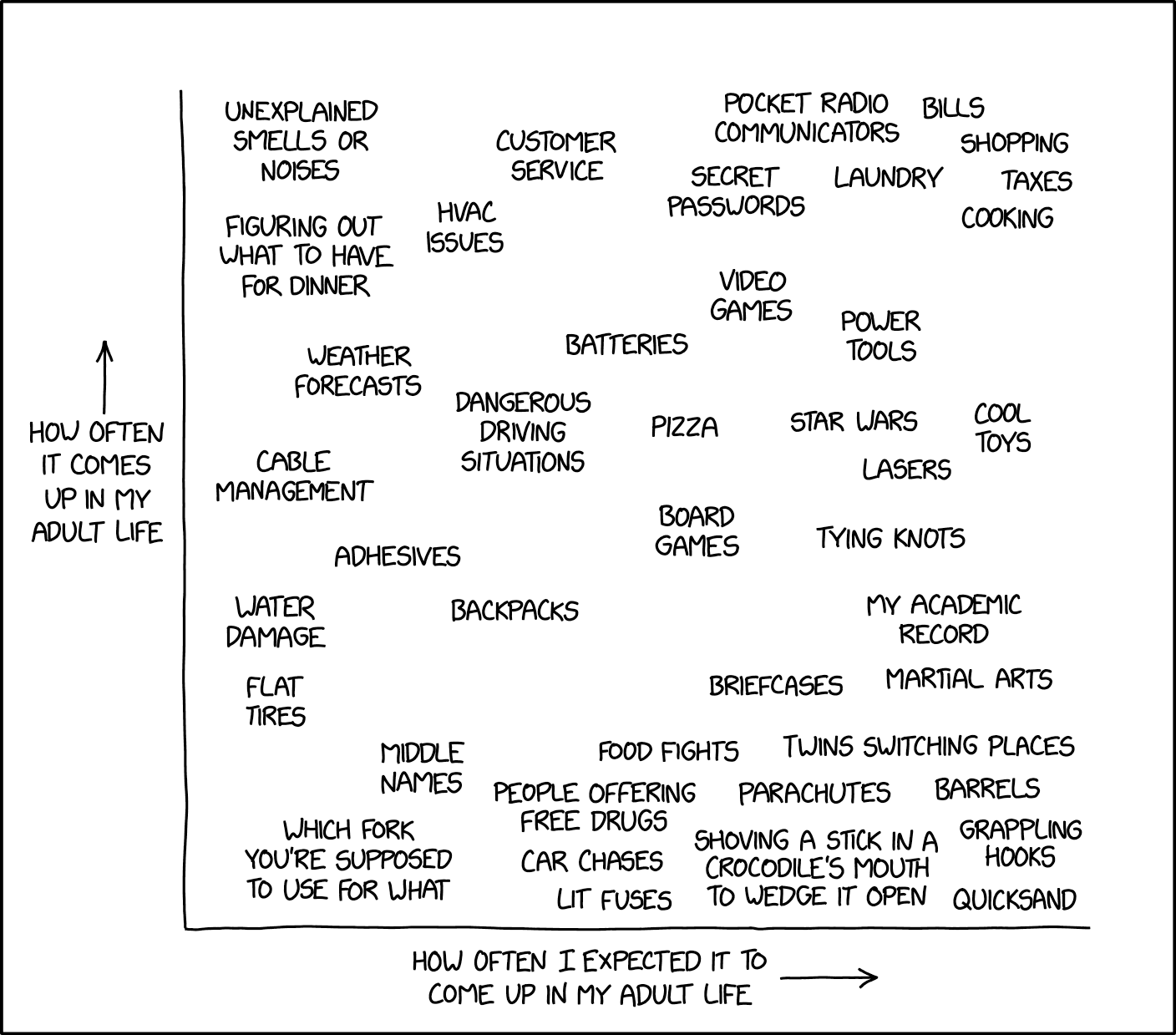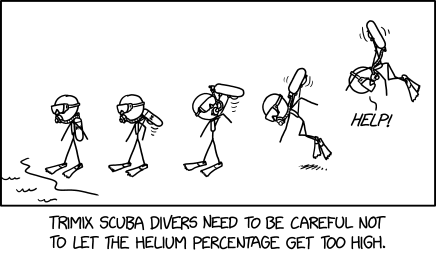That’s why you have to press firmly.
Slow clap.
Call our paper weight (in kg/m^2) p and our side-length is s. Ignoring things like the difference between \pi and 4, we have:
\frac{s}{2^{90}} = \frac{2Gm}{c^2} = m \cdot 1.5e^{-27}
s^2p = m
Which actually works out to the fairly clean-looking sp = 0.54 . 100-gram paper (a pretty normal weight) gives an s of 6.4 meters.
I’m not following; where are you getting 290 from?
2^{90} is the length scaling in each dimension–90 halvings in X, 90 in Y.
But re-reading it, I see that it’s actually 189 halvings total, for ~95 in each dimension.
The difference actually makes it even closer to a typical sheet of paper. The Schwarzschild radius of a 5-gram object is 2.9e-28 inches. And (considering 8.5x11 paper) log2(11 in / 2.9237e-28 in) = 94.9. Very close!
It turns out I have been unknowingly spoiled by my heating system, which is hot water baseboard heat. My boiler stopped working last last week at midnight Saturday night when it got down to 9F (-13C) outside. Brrr! I mention the time and day because that meant it took almost exactly 11 hours to get someone out here and for them to finish fixing it. By the time they left, the entire house had dropped to between 53F and 54F (12C). I was friggin’ freezing!
Anyway, once it was back up and running it took many, many hours to warm the house all the way back up to my preferred 70F (21.0C). The better part of a day, I’d say. It turns out that taking so long to warm back up is one of the features of hot water baseboard heating. It’s fantastic at maintaining exact temperatures throughout the house, but terrible at heating up large changes in temperature.
I had been keeping an eye on my inside temperatures ever since this discussion and the temperature is almost always between 69.5F and 70.5F. On very rare occasions it will be +/-1F, but for example, just now when I checked my thermometer (not thermostat) says 69.8F. I simply do not experience these wild swings in temperature you apparently get with other systems.
So that’s why I was side-eyeing the original claim:
My thermostat genuinely is keeping my house within 1°F. I am not delusional.
(It took me like a week to remember which thread this conversation happened in.)
It’s not so much the thermostat as the fact that water has a very high latent heat, so even a ½° difference takes a long time to heat up and cool down. Think of your thermostat working by time instead of temperature– five minutes on and five minutes off for example. That’s hard to do with blown air, much easier with water. If your heating system worked by heating a huge slab of granite that your house was sitting on it would be much the same.
Do you have any experience with underfloor heating, or whatever they call it when the water pipes snake throughout the entire floor area? I remember not being very impressed with it, but that could have been an underpowered or crappy system.
No experience with underfloor heating, no. If you’re asking in the sense of would it take an underfloor water heating system forever to effect a major temperature change like it did my hot water baseboard heating, google implies that it would be similar, yes.
Seems like somebody around here took a couple days off from Doping. Anyhow, here’s xkcd: Mon 1/6/2025 - Features of Adulthood

Hover text:
I don’t dig pit traps and cover them with sticks and a thin layer of leaves nearly as much as I expected; I find a chance to do it barely once a month.
Note that “I was right” is a diagonal line from bottom left to top right, with increasing error the greater distance from that line.
For me, the upper-left contains “every surface at my house constantly accruing grodiness”.
Growing up, my mom vacuumed and cleaned things quite a bit. But I figured that if I’m just generally clean and don’t track stuff in, things will mostly stay clean.
Nope. Not even close. Everything is constantly in a state of becoming disgusting. Dust covers everything. The floor of my shower–which one would think just naturally stays clean–gets a disgusting dark film that I have to scrub away. Lightswitches that I barely interact with get a similar grimy film. Floors have to be vacuumed whether I walk on them or not. Counters have to be wiped clean whether I use them or not. Anything remotely in range of the stove gets covered in oil particles. Glass tabletops get gunk on the bottom that I have to clean. It’s just endless.
Humans are just revolting bags of grease that somehow we spread to every possible surface even when we’re trying not to. It’s amazing.
Shrug … It wasn’t there the last time I checked yesterday and I got distracted by the OotS update and various news events earlier today and forgot to check.
I did not mean that as a criticism. I apologize if it came off that way.
Normally you’re about as reliable as clockwork. So I was surprised to not find it already posted. I actually felt a little bit bad usurping your customary role without permission.
Never worry about that. I really don’t care if someone else does it first.
Hear! Hear!
I was hoping the grappling hooks and shoving a stick in a crocodile’s mouth would come up more often, but one quicksand incident is quite enough.
More car chases and food fights would definitely be an improvement. As would less / fewer HVAC issues and cable management.

“You don’t want the nitrogen percentage to be too high or you run the risk of eutrophication.”
To save everyone googling: eutrophication: occurs when the environment becomes enriched with nutrients, increasing the amount of plant and algae growth to estuaries and coastal waters.
This was perplexing. I see from the second page of Google results that Trimix is a mixture of gases used in scuba diving, so that makes sense. But all the other results defined Trimix as a brand-name drug for erectile dysfunction, which was really confusing! “Is the joke supposed to be that his tank is getting an erection?”